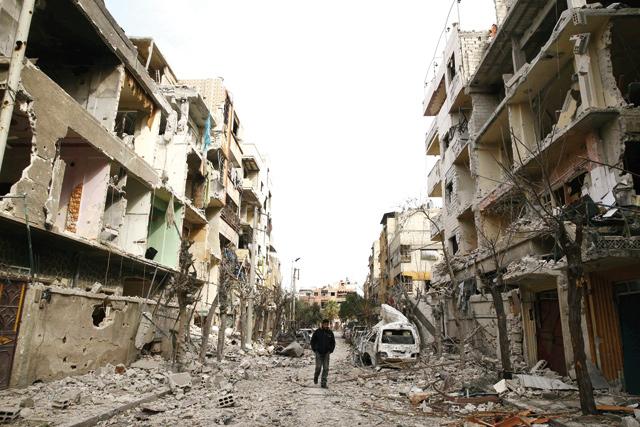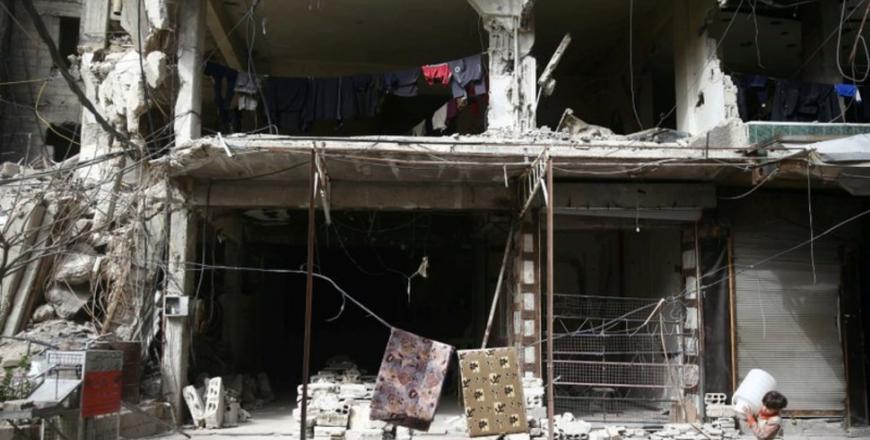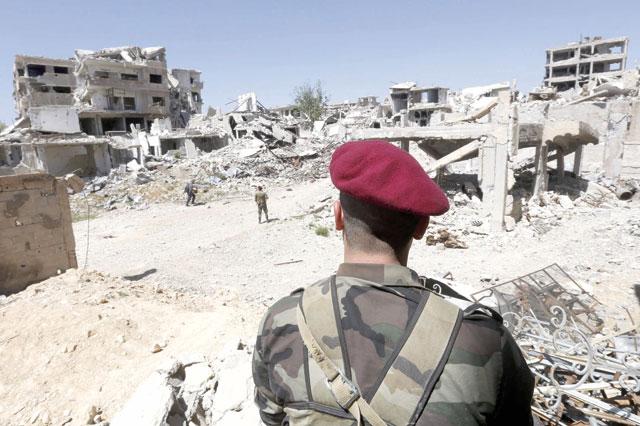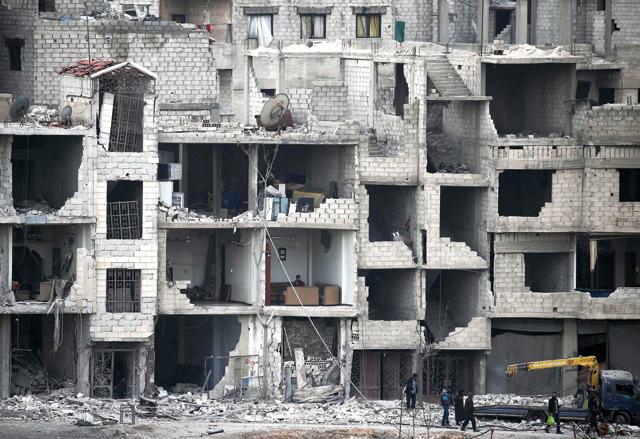You are here
Strikes, clashes hit Syria’s Ghouta despite ceasefire call
By AFP - Feb 25,2018 - Last updated at Feb 25,2018

A man walks on a damaged street in the besieged town of Douma, Eastern Ghouta, Damascus, Syria, on Monday (Reuters photo)
DOUMA, Syria — New regime air strikes and heavy clashes shook Syria's rebel enclave of Eastern Ghouta on Sunday despite a UN demand for a ceasefire to end one of the most ferocious assaults of Syria's civil war.
After days of diplomatic wrangling, the Security Council on Saturday adopted a resolution calling for a 30-day ceasefire in Syria "without delay", to allow for aid deliveries and medical evacuations.
President Bashar Assad's forces launched a major bombing campaign against the enclave on the edge of Damascus a week ago, with more than 500 people since killed.
The UN resolution has raised hopes of stemming the bloodshed but it remains unclear when or how broadly the ceasefire could be implemented.
Russia is a key ally of Assad’s regime and in a phone call on Sunday German Chancellor Angela Merkel and French President Emmanuel Macron urged President Vladimir Putin to use his influence.
They called on Russia “to exercise maximum pressure on the Syrian regime to achieve an immediate suspension of air raids and fighting”, Merkel’s office said in a statement.
Pope Francis also joined international calls for a ceasefire, saying in his Sunday Angelus prayers: “All this is inhuman. One cannot fight evil with another evil”.
In Douma, the main town in Eastern Ghouta, fresh air raids and artillery strikes could be heard on Sunday, an AFP correspondent in the town said.
Ground fighting intensifies
At least seven civilians were killed in strikes on Sunday, according to the Syrian Observatory for Human Rights monitoring group, bringing the total number of dead in the week to 527, including 129 children.
Although there appeared to be fewer air strikes, Observatory chief Rami Abdel Rahman said, fighting had intensified on the ground.
Heavy clashes erupted in southern areas of Eastern Ghouta, he said, with at least 13 members of pro-regime forces and six fighters from the Jaish Al-Islam rebel group killed.
“They are the most violent clashes to take place since the beginning of the month,” said Abdel Rahman, whose Britain-based group uses a network of sources across Syria to monitor the country’s conflict.
Mohamed Alloush, a key figure in Jaish Al-Islam, tweeted that the rebels were “resisting” bids by regime forces to enter the region.
Eastern Ghouta, home to some 400,000 people, is surrounded by government-controlled territory and its residents are unwilling or unable to flee.
The two main rebel groups controlling the enclave — Jaish Al Islam and Faylaq Al Rahman — welcomed the Security Council demand, but vowed to fight back in case of renewed attacks.
Jaish Al Islam said it was “committed to protecting humanitarian convoys” but warned it would “immediately respond to any violation”.
UN diplomats say Saturday’s Security Council resolution was watered down to ensure it was not vetoed by Russia, which has provided diplomatic and military support to Assad’s regime.
Language specifying that the ceasefire would start 72 hours after adoption was scrapped and the term “immediate” was dropped in reference to aid deliveries and evacuations.
In another concession, the ceasefire would not apply to operations against the Daesh group or Al Qaeda, along with “individuals, groups, undertakings and entities” associated with the terror groups.
Syria’s former Al Qaeda affiliate is present in Eastern Ghouta and Assad’s regime routinely describes all of its opponents as “terrorists”.
Iran’s army chief-of-staff said Sunday that the Syrian military would continue to target “terrorist groups” in Eastern Ghouta.
“The zones on the periphery of Damascus... are not covered by the ceasefire and the offensives and clearing operations by the Syrian army will continue,” said Mohammad Bagheri, according to the official IRNA news agency.
Iran has also been a key ally of Assad’s regime.
UN Secretary General Antonio Guterres, who has described Eastern Ghouta under the bombardment as “hell on Earth”, said the ceasefire must be “immediately” implemented.
‘Used to betrayals’
In the enclave, news of the UN vote was greeted with a shrug.
“I don’t think this decision will be implemented. It will be respected neither by the regime nor Russia,” said Douma resident Abu Mazen.
“We cannot trust Russia or the regime. We are used to their betrayals,” he added.
Russia has been pressing for a negotiated withdrawal of rebel fighters and their families from Eastern Ghouta, like the one that saw the government retake full control of Syria’s second city Aleppo in December 2016.
But rebel groups have refused.
The rebels in Eastern Ghouta have also been firing into Damascus.
Around 20 people have been killed in eastern districts of the capital since February 18, according to state media.
A total of more than 340,000 people have been killed and millions driven from the homes in Syria’s war, which next month enters its eighth year with no diplomatic solution in sight.
Related Articles
AMMAN/BEIRUT - Thousands of families are sleeping in the open in the streets of the biggest town of Syria’s rebel-held eastern Ghouta enclav
DAMASCUS, Syria — Syria's regime drew closer to taking full control of Eastern Ghouta on Monday as state media reported that fighters began
BEIRUT/MOSCOW — Russia will establish a humanitarian corridor and implement a five-hour daily truce in Syria's Eastern Ghouta, it said on Mo














